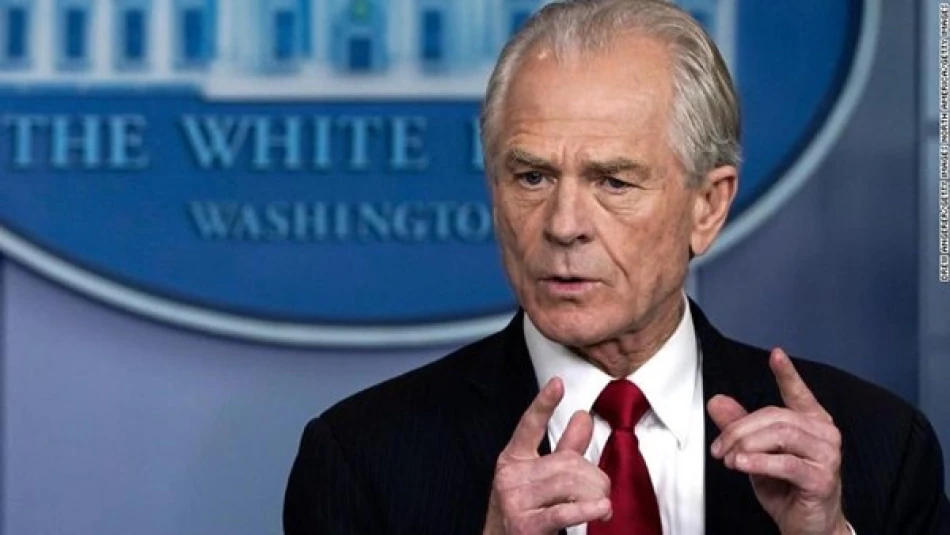
US Official Optimistic Supreme Court Will Uphold Tariffs
Trump's Tariff Gamble Faces Supreme Court Test After Federal Appeals Defeat
A federal appeals court has dealt a significant blow to President Donald Trump's sweeping tariff agenda, ruling 7-4 that he lacks the authority to impose broad import duties without time limits. While the tariffs remain in effect pending a Supreme Court decision, the ruling sets up a pivotal constitutional battle that could reshape presidential trade powers and America's economic relationship with the world.
The Legal Challenge That Could Redefine Presidential Authority
The Friday ruling by the federal appeals court strikes at the heart of Trump's trade strategy, which has relied heavily on unilateral tariff impositions since his return to office in January. The court specifically found that the president cannot impose tariffs on virtually all imports without temporal constraints—a direct challenge to the administration's open-ended approach to trade protection.
White House Trade Advisor Peter Navarro dismissed the decision as politically motivated, calling the majority judges "politicians in black robes" during his Sunday appearance on Fox News Sunday. His combative response reflects the administration's view that this case represents an existential threat to executive trade authority.
Constitutional Stakes: Executive Power vs. Congressional Authority
The legal dispute centers on a fundamental question of constitutional separation of powers. Historically, Congress has held primary authority over trade regulation, but successive presidents have expanded executive trade powers through various statutory authorities, particularly in national security contexts.
The appeals court's emphasis on time limits suggests judges are concerned about unchecked presidential power to reshape the economy indefinitely. This echoes similar constitutional tensions that arose during previous trade wars, including the Smoot-Hawley era of the 1930s, when Congress ultimately reasserted its trade authority after economic devastation.
Navarro's Confidence Despite Legal Setback
Despite the unfavorable ruling, Navarro expressed optimism about the Supreme Court appeal, citing what he called "very strong" counter-arguments from dissenting judges. His assertion that the dissents provide "a very clear roadmap" for Supreme Court victory suggests the administration believes the high court's conservative majority may be more receptive to broad executive trade powers.
Navarro's dramatic claim that losing this case would mean "the end of the United States" underscores how central tariff authority has become to the administration's economic nationalism agenda.
Market and Economic Implications
The legal uncertainty creates a challenging environment for businesses and investors. Companies face the prospect of paying tariffs that could be retroactively invalidated, while also needing to plan for supply chains under multiple scenarios. This judicial limbo particularly affects sectors like manufacturing, retail, and agriculture that depend heavily on imported inputs or export markets vulnerable to retaliation.
Financial markets have historically shown volatility during major trade policy uncertainty. The current situation mirrors aspects of the 2018-2019 trade war period, when tariff announcements and legal challenges created persistent market instability.
Broader Context: America's Trade Policy Evolution
This legal battle occurs against the backdrop of America's increasingly contentious relationship with global trade norms. Unlike countries such as Singapore or the UAE, which have embraced free trade as economic development strategies, the U.S. has moved toward greater protectionism across multiple administrations.
The case also highlights the coalition opposing the tariffs: Democratic states and small business groups who argue that broad import duties function as regressive taxes on consumers while disrupting established supply chains. This opposition reflects the complex domestic politics of trade policy, where benefits often concentrate among specific industries while costs spread across the broader economy.
Supreme Court Showdown Ahead
The Supreme Court's eventual decision will likely determine not just the fate of these specific tariffs, but the broader scope of presidential trade authority for years to come. A ruling favoring the administration could establish precedent for expansive executive trade powers, while a decision upholding the appeals court could force future presidents to work more closely with Congress on major trade initiatives.
Given the Court's conservative majority and general deference to executive authority in foreign affairs, the administration may indeed have grounds for Navarro's optimism. However, the appeals court's focus on constitutional limits and the bipartisan nature of trade authority concerns suggest the outcome remains genuinely uncertain.
Most Viewed News

 Layla Al Mansoori
Layla Al Mansoori






